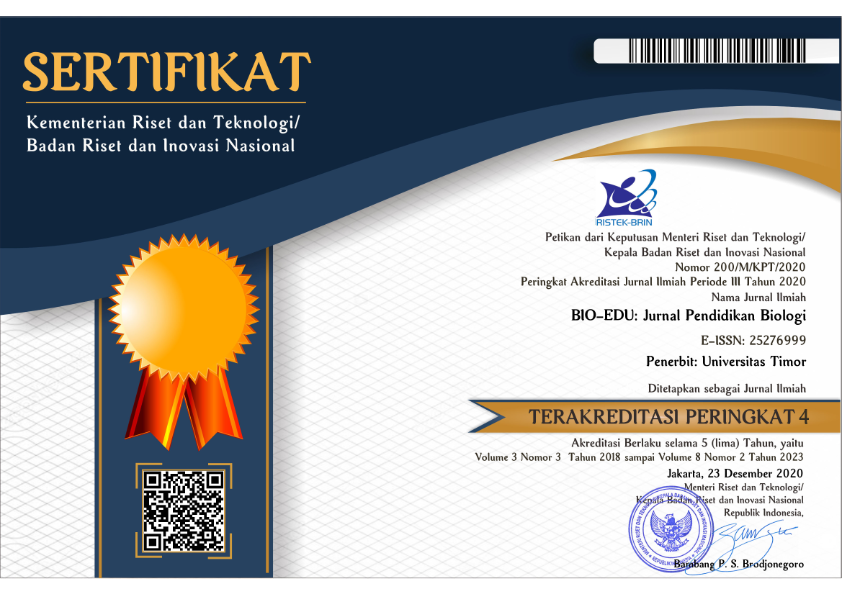Hasil Belajar Calon Guru dalam Perkuliahan Berbasis Proyek: Kajian Deskriptif Pada Mata Kuliah Botani Tumbuhan Tinggi
DOI:
https://doi.org/10.32938/jbe.v6i3.4134Keywords:
Learning outcomes, Project-based learning, Teacher candidatesAbstract
The purpose of this study was to analyze the learning outcomes of teacher candidates in project-based learning. This research is a descriptive study with a quantitative approach. The research subjects were 26 students of the Biology Education study program at Timor University who were taking the Botany of Higher Plants course. Data was collected using a learning outcome test. The results showed that the learning outcomes of teacher candidates in project-based learning were in a good category with a score of 68.17. This shows that the application of project-based learning has a positive impact on empowering teacher candidates' learning outcomes. Learning becomes not boring and not just memorization because teacher candidates are given the opportunity and responsibility to learn actively from the projects that are carried out. Teacher candidates have a significant role in all stages of project-based learning from project planning, data collection, data organization, data processing, and presentation in project reports. Therefore, it is expected that project-based learning can be done consistently so that it can empower the learning outcomes of teacher candidates.
References
Affandi, A., & Sukyadi, D. (2016). Project-based learning and problem-based learning for EFL students’ writing achievement at the tertiary level. Rangsit Journal of Educational Studies, 3(1), 23–40. https://doi.org/10.14456/RJES.2016.2
Bhakti, C. P., & Maryani, I. (2016). Strategi LPTK dalam Pengembangan Kompetensi Pedagogik Calon Guru. Jurnal Pendidikan, 1(2), 98-106
Chen, C.H., & Yang, Y.C. (2019). The effects of project-based learning on students’ academic achievement: A meta-analysis investigating moderators.Educational Research Review, 26, 71–81. https://doi.org/10.1016/j.edurev.2018.11.001.
Goksoy, S. (2014). Teacher Candidates’ (Pedagogical Formation Students’) Communication Skills. Creative Education, 5, 1334-1340.. http://dx.doi.org/10.4236/ce.2014.514152
Guo, P., Saab, N., Post, L.S., & Admiraal, W. (2020). A Review of Project-Based Learning in Higher Education: Student Outcomes and Measures. International Journal of Educational Research, 102(2020), 1-13
Hasnunidah, N., & Wiono, W.J. (2019). Botani Tumbuhan Tinggi. Yogyakarta: Graha Ilmu
Junaidi, A., Wulandari, D.W., Arifin, S., Soetanto, H., Kusumawardani, S.S., Wastutiningsih, S.P., Utama, M.S., Cahyono, E., Hertono, G.F., Syam, N.M., Jumaipa, H., Putra, P.H., Wijayanti, C., & Jobith. (2020). Panduan Penyusunan Kurikulum Pendidikan Tinggi di Era Industri 4.0 Untuk Mendukung Merdeka Belajar-Kampus Merdeka. Jakarta: Direktorat Jenderal Pendidikan Tinggi Kementerian Pendidikan dan Kebudayaan
Kaur, S. (2019). Role of a Teacher in Student Learning Process. International Journal of Business and Management Invention (IJBMI). 8(12), 41-45
Kim, S., Raza, M., & Seidman, E. (2019). Improving 21st-century Teaching Skills: The Key to Effective 21st-century learners. Research in Comparative & International Education, 1-19. DOI: 10.1177/1745499919829214
Makovec, D. (2018). The teacher’s role and professional development. International Journal of Cognitive Research in Science, Engineering and Education, 6(2), 33–45. https://doi.org/10.5937/ijcrsee1802033M
Marhadi, H., & Erlisnawati. (2016). Peningkatan Hasil Belajar Mahasiswa Pada Mata Kuliah Manajemen Kelas Dengan Penerapan Model Pembelajaran Kooperatif Tipe Group Investigation Program Studi Pendidikan Guru Sekolah Dasar Universitas Riau. Jurnal Primary Program Studi Pendidikan Guru Sekolah Dasar, 5(1), 1-13
Puspita, L., Yetri, Y., & Novianti, R. (2017). Pengaruh Model Pembelajaran Reciprocal Teaching Dengan Teknik Mind Mapping Terhadap Kemampuan Metakognisi Dan Afektif Pada Konsep Sistem Sirkulasi Kelas XI IPA Di SMA Negeri 15 Bandar Lampung. Biosfer: Jurnal Tadris Biologi, 8(1), 78–90. https://doi.org/10.24042/biosf.v8i1.1265
Rahayu, D.S. (2016). Respons Mahasiswa Terhadap Pembelajaran Berbasis Proyek Pada Mata Kuliah Statistika. Jurnal Pendidikan dan Pembelajaran Matematika (JP2M), 2(2), 14-24
Rahmadani, W., Harahap, F., & Gultom, T. (2017). Analisis Faktor Kesulitan Belajar Biologi Siswa Materi Bioteknologi di SMA Negeri Se-Kota Medan. Jurnal Pendidikan Biologi, 6(2). https://doi.org/10.24114/jpb.v6i2.6546
Rajan, K. P., Gopanna, A., & Thomas, S. P. (2019). A Project Based Learning (PBL) Approach Involving PET Recycling In Chemical Engineering Education. Recycling, 4(10), 1–16. https://doi.org/10.3390/recycling4010010
Saat, S. (2015). Faktor-faktor Determinan dalam Pendidikan (Studi Tentang Makna dan Kedudukannya dalam Pendidikan). Jurnal Ta’dib, 8(2), 1–17
Saparuddin & SyakuR, A. (2017). Pengembangan Media Album Foto Sebagai Bahan Ajar Dalam Mata Kuliah Botani Tumbuhan Tinggi. Biogenerasi, 2(9), 31-41
Suryanti, E., Fitriani, A., Redjeki, S., & Riandi, R. (2019). Identifikasi Kesulitan Mahasiswa Dalam Pembelajaran Biologi Molekuler Berstrategi Modified Free Inquiry. Perspektif Pendidikan Dan Keguruan, 10(2), 37–47. https://doi.org/10.25299/perspektif.2019.vol10(2).3990
Usher, M., & Barak, M. (2018). Peer assessment in a project-based engineering course: Comparing between on-campus and online learning environments. Assessment Evaluation in Higher Education, 43(5), 745–759. https://doi.org/10.1080/02602938.2017.1405238
Vogler, J. S., Thompson, P., Davis, D. W., Mayfield, B. E., Finley, P. M., & Yasseri, D. (2018). The hard Work of Soft Skills: Augmenting the Project-Based Learning Experience with Interdisciplinary Teamwork. Instructional Science, 46(3), 457–488. https://doi.org/10.1007/s11251-017-9438-9.
Wurdinger, S., & Qureshi, M. (2015). Enhancing college students’ life skills through project based learning. Innovative Higher Education, 40(3), 279–286. https://doi.org/10.1007/s10755-014-9314-3.
Downloads
Published
Issue
Section
License
The Authors submitting a manuscript do so on the understanding that if accepted for publication, the copyright of the article shall be assigned to BIO-EDU: Jurnal Pendidikan Biologi and Departement of Biology Education, Universitas Timor as the publisher of the journal. Copyright encompasses rights to reproduce and deliver the article in all form and media, including reprints, photographs, microfilms, and any other similar reproductions, as well as translations.
BIO-EDU journal and Departement Biology Education, Universitas Timor, and the Editors make every effort to ensure that no wrong or misleading data, opinions, or statements be published in the journal. In any way, the contents of the articles and advertisements published in BIO-EDU are the sole and responsibility of their respective authors and advertisers.
Users of this website will be licensed to use materials from this website following the Creative Commons Attribution-ShareAlike 4.0 International License.



















